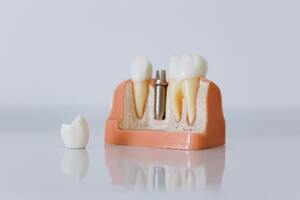If you’ve had a tooth extracted or are missing a tooth or two, you’ll have a gap between your teeth. Dentures, bridges, and implants are options to replace those missing teeth. But which is the best choice for you? See these five questions about dental implants answered to help you decide.
1. What is a Dental Implant?
The dental implant is a more permanent replacement for a tooth or several teeth. A dental implant has three parts:
- a screw-like post usually made of titanium
- a post extension, and
- an artificial tooth (crown)
The post is implanted into the jawbone. The extension attaches to the top of the post, and the crown inserts over the extension. The result is a natural-looking artificial tooth that holds firmly, enabling proper biting and chewing.
2. Are there Other Options?
A fixed-tooth bridge is another preferred option for replacing a single tooth. For a bridge, the two surrounding teeth are filed down, and the bridge (artificial teeth) is then inserted over the top of the filed teeth.
Alternatively, with a dental implant, the surrounding teeth aren’t damaged. Instead, the post is inserted into the jawbone, fusing with the bone creating a strong, permanent base to hold the false tooth.
3. What are the Benefits of Dental Implants?
Implants help the jawbone stay healthy. Because you’ve lost a tooth, the bone around the original root area deteriorates. As the implant inserts directly into the jaw, bone growth is stimulated and retains a healthy density. Dentures or bridges don’t halt bone loss.
Another benefit of dental implants is that hygiene is the same, with brushing and flossing performed as usual.
4. Disadvantages of Dental Implants
Poor dental hygiene can lead to an infection around the implant, known as peri-implantitis. The disease damages surrounding tissue and bone, causing the implant to fail. Daily brushing, flossing, and regular scaling and cleaning by your dentist will prevent peri-implantitis.
Another potential setback with dental implants is time. As an implant happens in three stages — post, extension, and crown — it takes roughly five to eight months to complete. The slowest phase is the first, where bone growth around the implant must happen.
5. Are Implants Painful?
With various forms of sedation dentistry available, the procedure itself can be relatively painless. However, post-op, the initial implant into the jaw may cause some initial discomfort during healing. Still, most patients report this as easily managed with over-the-counter medication only needed for a few days.
Tired of Tooth Gaps?
If you’re ready to head off jawbone decline and eating problems from tooth loss, get in touch with us at Cowdin Cosmetic Dentistry. Our expert staff will provide the best solution for you, whether dentures, bridges or dental implants.





